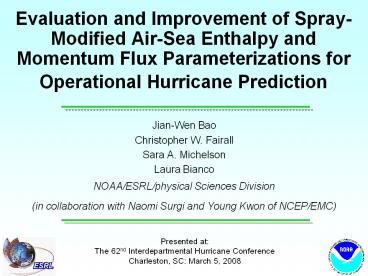Jian-Wen Bao - PowerPoint PPT Presentation
1 / 11
Title:
Jian-Wen Bao
Description:
(in collaboration with Naomi Surgi and Young Kwon of NCEP/EMC) ... experiments have been conducted on Haze with Katrina (2005), Rita (2005), Emily ... – PowerPoint PPT presentation
Number of Views:27
Avg rating:3.0/5.0
Title: Jian-Wen Bao
1
Evaluation and Improvement of Spray-Modified
Air-Sea Enthalpy and Momentum Flux
Parameterizations for Operational Hurricane
Prediction
- Jian-Wen Bao
- Christopher W. Fairall
- Sara A. Michelson
- Laura Bianco
- NOAA/ESRL/physical Sciences Division
- (in collaboration with Naomi Surgi and Young Kwon
of NCEP/EMC)
Presented at The 62nd Interdepartmental
Hurricane Conference Charleston, SC March 5,
2008
2
OUTLINE
- Parameterization of sea-spray mediated sensible
and latent heat fluxes - Parameterization of sea-spray modification of
momentum flux - Implementation and testing of the ESRL sea-spray
scheme in the HWRF model - Summary and Preliminary Conclusions
3
Parameterization of Sea Spray Wind Speed
DrivenFairall/Andreas/Kepert Early 1990s
Raw Direct sensible
Raw Direct Latent
Raw Droplet Sensible
Raw Droplet Latent
Net fluxes emerging from top of droplet layer
Alpha accounts for SUBGRID feedback (droplet
T/q profile interactions)
4
Feedback
The thermal feedback is defined by distortions of
the temperature and humidity profiles in the
droplet filled surface layer dT and dq, which
are determined by the source strength and
residence time.
5
Parameterization of the Sea-Spray Modification of
Momentum Flux (e.g., Barenblatt 1996 and
Lykossov 2001)
where S is the spray concentration profile.
Where
the mean fall speed of droplets
empirical parameter
spray generation height
6
Impact on the Exchange Coefficients
7
Implementation in the HWRF model
- The subroutine of the NOAA/ESRL sea-spray
parameterization is called by (and appended to
the end of) module_bl_gfs.F - A function routine (function qsat_spray) is added
to module_gfs_funcphys.F - Testing experiments have been conducted on Haze
with Katrina (2005), Rita (2005), Emily (2005),
Dennis (2005) and Helene (2006).
8
max. wind speed
min. sea-level pressure
track
Test with Katrina (2005)initial time 0000 UTC
27 August 2005
9
Test with Katrina (2005)
control
thermal
thermal momentum
Valid at 0060 UTC 29 Aug 2005
10
Test with Katrina (2005)
thermal
control
thermal momentum
Valid at 0060 UTC 29 Aug 2005
11
Summary and Conclusions
- The impact of the sea-spray parameterization on
the track forecast is negligible, despite the
noticeable impact on the intensity. - Both the intensity and structure are influenced
by the parameterized thermal and kinematic
effects of sea spray. - The response of the storm intensity does not
appear to be proportional to the change in the
droplet source strength and feedback strength. - The errors in the HWRF model forecast can only be
partially - attributed to the errors in the surface
fluxes. - The performance of the sea-spray parameterization
scheme in the HWRF model needs to be further
evaluated and calibrated.































